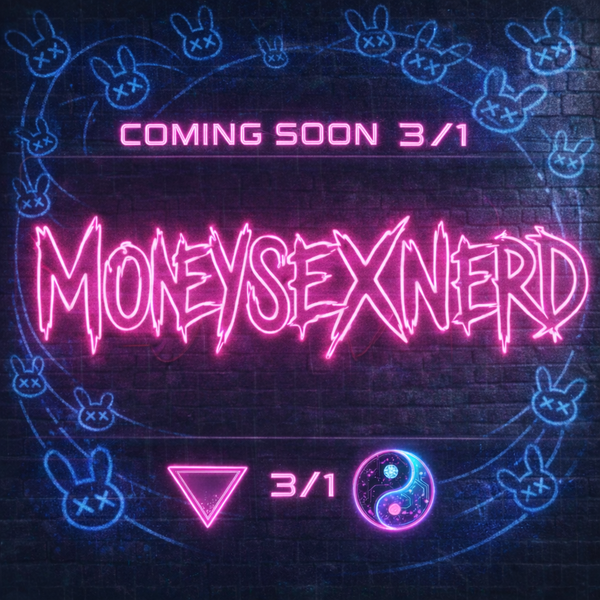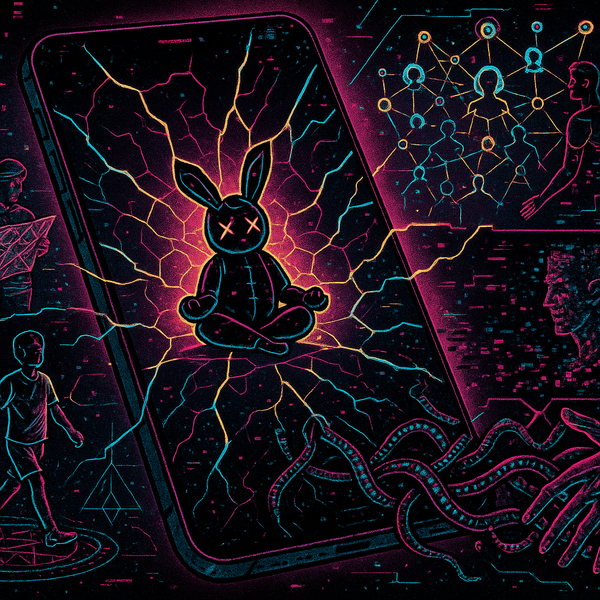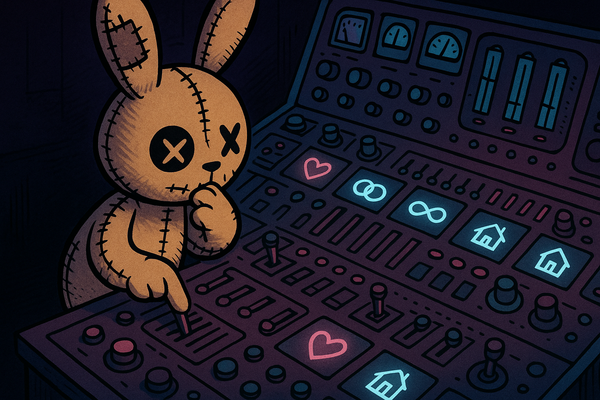The Front Door Principle: The Law of Doors in the Age of AI
Every tech wave starts chaotic but ends monolithic. Windows, Google, Facebook, iPhone—each became infrastructure. Strategic commitment to ChatGPT creates compounding leverage through accumulated context.
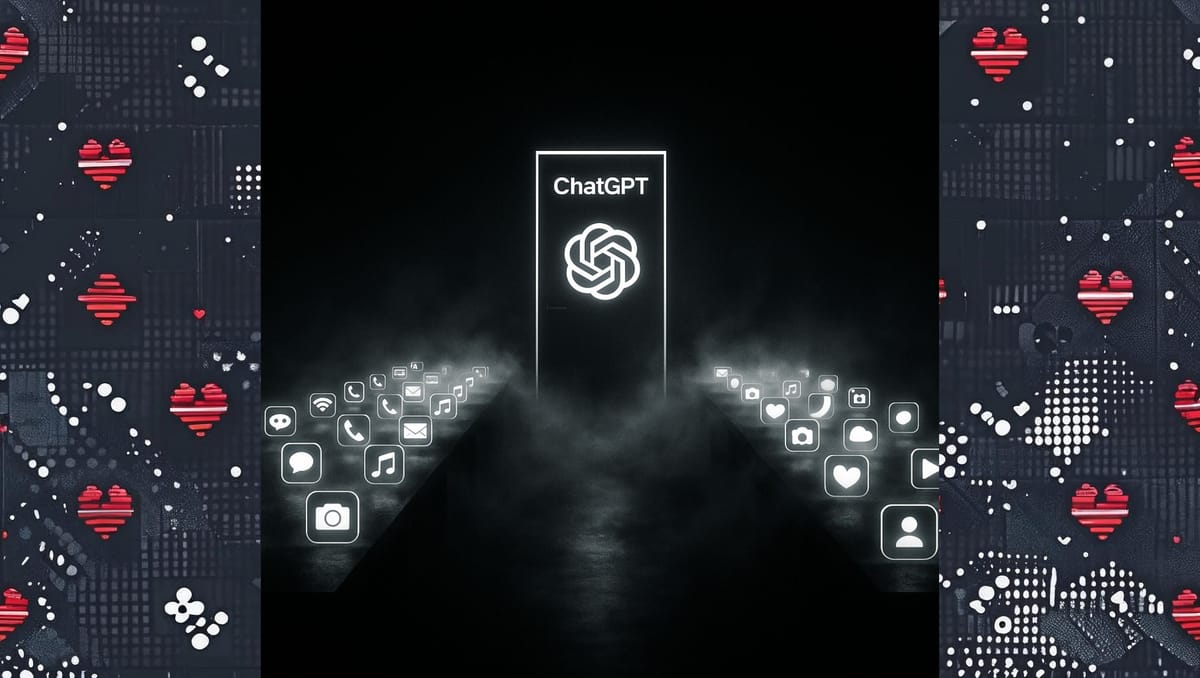
Prologue — The Illusion of Choice
Every technological age begins as a masquerade — flashing lights, dozens of brands, everyone claiming to be the future. Then the smoke clears, and one door remains.
In the ’90s, that masquerade was operating systems. Mac was for the faithful, Linux for the zealots, Windows for everyone else. It wasn’t the most beautiful or the most moral. It was just the most inevitable. It absorbed friction like a sponge until everyone quietly realized they were already inside.
That’s the secret rhythm of every wave: chaos gives birth to standardization. Multiplicity burns off into monopoly. The energy of the frontier always collapses into a single doorway sturdy enough to bear civilization’s weight.
And here we are again — staring at the buffet of AI tools, swearing this time is different.
It’s not.
I. The Law of Doors
The Law of Doors says this: systems compound only when you limit entrances.
Humans fantasize about optionality, but optionality is entropy. Every extra portal you keep open splits your attention, your data, your habits, your leverage. Each context switch burns glucose and resets the loop of compounding.
A “front door” isn’t about worshipping one company. It’s about protecting the physics of focus.
When all your creative or operational energy moves through one interface, it begins to stack on itself. You learn the idiosyncrasies of the platform. The habits build muscle memory. The friction drops to zero. You start compounding — not because the platform is magical, but because you finally stopped scattering your time.
Exploration has its place. But maturity means knowing where “home” is.
You can wander the city; you still need an address.
The Law of Doors is the operating principle behind every enduring empire of software. The interface that becomes home wins — not through novelty, but through Lindy.
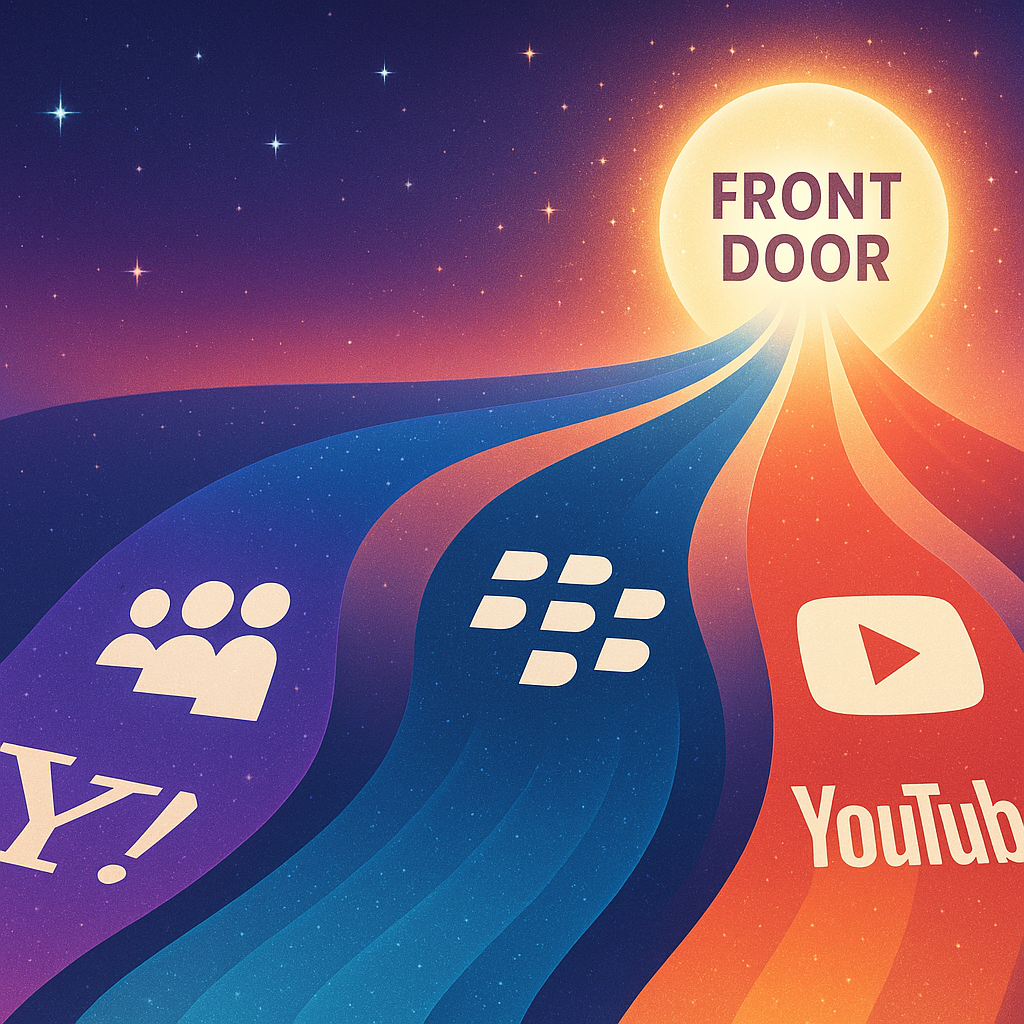
II. The Lindy Logic
The Lindy Effect, as we unpacked in How to Be Antifragile: The Art of Benefiting from Chaos, says that the longer something has survived, the longer it’s likely to survive. Survival compounds.
The longer a door stands open without collapsing, the more intelligence, history, and muscle accumulate around it. Endurance is self-reinforcing. A decade of user behavior becomes the moat.
That’s why trying every new tool doesn’t make you modern. It makes your effort diluted and forgettable.
True leverage comes from building inside systems that have already proven they can withstand time, chaos, and scale.
Lindy is how you know the difference between a revolution and a fad.
III. The Historical Collapse Pattern
Every wave starts loud and democratic. Screens light up, founders evangelize, everyone swears this time there will be options. The frontier fills with pioneers, each convinced their platform, protocol, or plug-in will change everything. But the math never lies. The graph always bends toward singularity. Variety breeds coherence; coherence hardens into monopoly; monopoly dissolves into infrastructure.
Windows was the first lesson in inevitability. The early PC/DOS era promised liberation — a wild bazaar of code, rebellion, and hobbyists soldering the future from basements. Then Microsoft walked in and standardized the chaos. It wasn’t the most elegant system or the most ethical. It was just the one that ran everywhere. The rebellion died not because people lost faith, but because they needed to work. Freedom became a file path. The same pattern repeated in search, in social, in mobile. Google turned curiosity into liturgy with a single white box. Facebook built the passport that made digital life legible. The iPhone turned hardware into ritual, collapsing every competing ecosystem into one glowing slab of glass. YouTube took what looked like chaos and taught it to self-organize through feedback loops so tight they became destiny.
By the time anyone noticed, the growth curves were already exponential — inevitability disguised as competition. Each “choice” was just noise until adoption crossed the S-curve and gravity took over. The ones who hedged across platforms felt prudent in the moment but ended up orphaned. The ones who picked a door early, stayed long, and learned its terrain became the new aristocracy. The lesson wasn’t about technology at all; it was about compounding.
Every business owner who built inside the Gmail wave — who learned Google’s search logic, ran their calendar and docs through the same spine, and fed that system faithfully — made or saved ten times the effort across decades. Every blogger who doubled down on early SEO instead of chasing every new network is still visible today, quietly ranking while their flashier peers burned out. The operators who committed to one door built leverage that outlived trends. Everyone else, the tourists who scattered their time across short-lived platforms, are ghosts in the archives. The pattern is eternal: the crowd starts drunk on choice and ends monogamous by default. The only real decision is how early you recognize the inevitability.

IV. The AI Wave
Now the buffet is back — ChatGPT, Claude, Gemini, Perplexity, a thousand wrappers promising to reinvent “workflow.” The cycle always starts this way: tourists graze, operators wait.
We are already past the midpoint of inevitability.
ChatGPT isn’t just a product; it’s the gravitational center of the language model era.
It has the user base, the integrations, the dev ecosystem, and — most importantly — the memory layer that turns it from novelty into infrastructure.
This doesn’t mean there won’t be others.
Claude is the Mac of this wave — elegant, literary, quieter. Some people will always prefer its temperament. Perplexity will remain the search-flavored cousin. Gemini will have its walled-garden faithful.
But the door that compounds for most usecases is ChatGPT. Not because it's technically best, but because it’s Lindy earliest and past the point of no return on the growth curve. It has endured the longest without collapsing, and every day that passes makes it harder to dislodge.
Picking a front door isn’t ideology. It's a cognitive strategy. You pick the interface where your data, habits, and memory stack — then you stop context-switching like a gambler.
You can’t automate chaos. You can only compound order.
V. How Leverage Compounds Inside a Door

Leverage starts the moment repetition becomes recursion.
Most people use AI like a vending machine: one prompt, one output, next snack. Operators use it like a workshop — where every tool, file, and instruction accumulates context.
Inside ChatGPT Projects, this finally formalizes.
Two primitives do the heavy lifting:
- Instructions — who you are, what you care about, how you operate.
- Files — your living archive: SOPs, logs, templates, datasets.
Every new chat inherits both. No re-explaining, no resets. The system doesn’t start from scratch — it starts from you.
This is where AI stops being novelty and starts being infrastructure.
Example paths:
The Operator.
Your company SOPs, compliance manuals, and proposals live in one Project. You refine them daily. GPT becomes your chief of staff — context-aware, tireless, consistent.
The Creator.
Your tone guide, hashtags, scripts, and past pieces live in Files. You ask for captions, and it mirrors your style perfectly because it’s learned your rhythm through repetition.
The Individual.
Your training logs, nutrition notes, labs, and constraints live in one thread. GPT generates plans as if it’s known you for years — because it has.
The Portfolio Manager.
A list of assets you own or manage like real estate addresses, stock tickers or collectibles with investment goals, purchase prices and other parameters. GPT helps you decide when to buy, sell and will do research for you. On command. Exactly the way you like it. Every time.
What makes this sacred isn’t automation. It’s accumulation.
Tourists collect apps; operators compound memory.
VI. The Law of Doors Applied
The mature operator knows exploration is cheap but focus is sacred. You can play with other tools, but you do it consciously, with a return ticket home.
Every serious creator, founder, or analyst eventually needs one platform where their work lives and grows. That’s the difference between activity and architecture.
The Law of Doors reframes adoption as design:
You’re not chasing every tool; you’re curating your center of gravity.
Each artifact you run through your front door — every script, brief, caption, dataset — adds to its intelligence. Your system becomes less of a “tool” and more of an organism that remembers you.
That’s leverage. That’s Lindy. That’s the quiet compounding that tourists never see.

VII. The Discipline to Stay Put
The frontier always masquerades as freedom, but freedom without focus decays into noise.
Every generation thinks it’s too advanced to repeat the old cycle. Every generation ends up worshipping a new door. The only difference between tourists and operators is self-awareness: the operator knows he’s choosing his cage on purpose.
Staying put doesn’t mean stagnation; it means letting the room evolve around you. The cathedral of Windows became the cloud. The search box became the nervous system. The chat window is about to become the operating system for human thought.
By 2030, “AI” will stop being a product category. It’ll be the substrate everything else runs on — the invisible infrastructure under your creative, operational, and intellectual life.
The tourists will still be hopping platforms, whispering about “alternatives.”
The operators will be running empires from a single chat thread.
That’s the paradox of mastery:
The longer you stay with one door, the more the world rearranges itself around you.
MoneySexNerd calls this The Law of Doors.
Systems don’t compound because they’re clever.
They compound because someone had the discipline to stop leaving.


